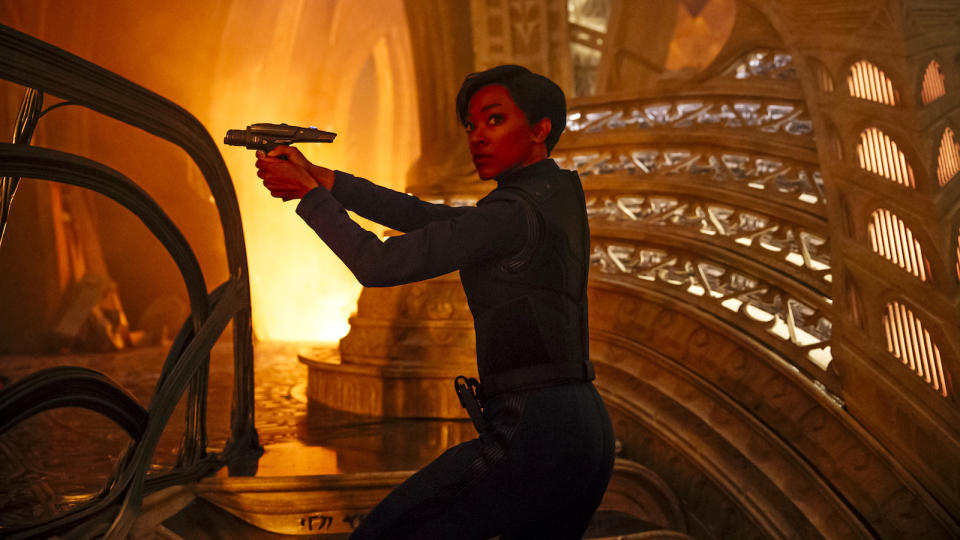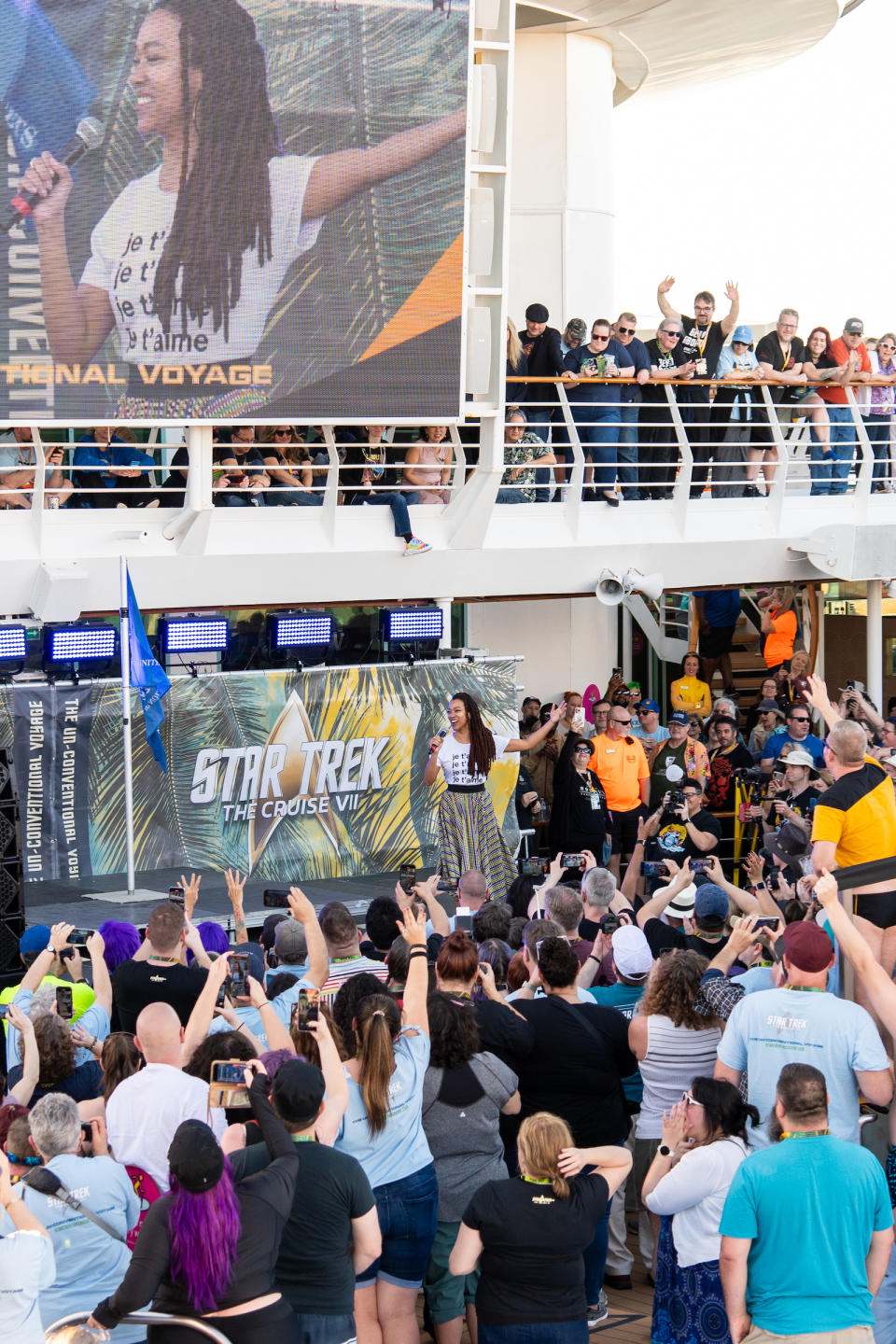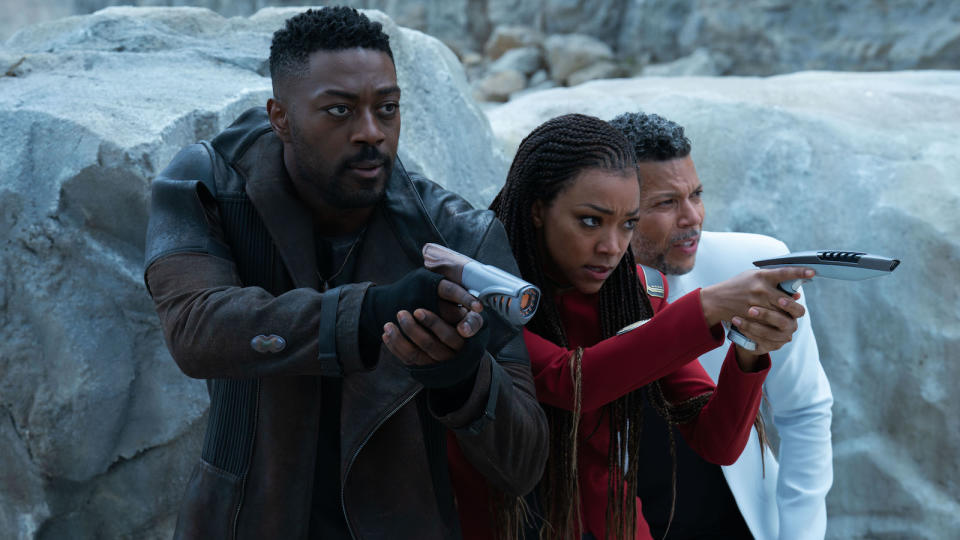‘Star Trek: Discovery’ Star Sonequa Martin-Green on the Show’s Unexpected Final Season, the ‘Pressure’ of Representation and Taking the ‘Trek’ Cruise

Sonequa Martin-Green’s first memories of “Star Trek” are of her parents watching it on TV — but really, they’re of Nichelle Nichols.
“I don’t even know as a child if I knew her real name, but I knew, here’s this beautiful Black woman,” Martin-Green says. “This is Uhura.”
More from Variety
'The Masked Singer' Reveals Identity of Lizard: Here Is the Celebrity Under the Costume
Netflix Top 10: '3 Body Problem' Rises to No. 1 Followed by 'Testament: The Story of Moses'
Those memories — and that instinctive sense of the character’s significance — have stayed with Martin-Green through her seven years making “Star Trek: Discovery” as the first Black woman to headline a series in the venerated science fiction franchise. “Star Trek” had been absent from television for 12 years when “Discovery” launched in 2017, but as the flagship Paramount+ series premieres its fifth and final season on April 4, the franchise has the most robust slate of TV titles in its history, with a new show, the “Discovery” spin-off “Starfleet Academy,” set to begin filming later this year in the same Pinewood Toronto soundstages as its predecessor.
When Martin-Green and her castmates shot Season 5, they didn’t know that it would be the final mission for “Discovery”; the show was well into post-production on the season when Paramount+ made the announcement. But in an uncommon show of goodwill, the streamer and CBS Studios carved out an additional three-day shoot for the series finale so “Discovery” could have a proper send off.
“We wanted to conclude on a high note, and it was so important to honor the series’ incredible legacy and to give it the final season it deserves,” says Jeff Grossman, EVP of Paramount+ programming. “We’re so grateful to the producers for developing an extraordinary coda to bring ‘Discovery’ to a close.”
Remarkably, even though they weren’t designed to be this way, the first four episodes of the season, which Variety has screened, have a striking finality to them. Several characters make momentous life choices while the crew of the USS Discovery embark on a season-long adventure that feels like a culmination of sorts for everything they’ve experienced to that point.
“I think it will feel like we had baked it from the beginning,” says executive producer and showrunner Michelle Paradise.
In a wide-ranging interview for Variety’s March 27 cover story on the future of “Star Trek,” Martin-Green discussed her reaction when she learned “Discovery” would end with Season 5, how she worked through her “stagnating” need for perfection in the early seasons, and what it was like joining the seven-day “Star Trek” cruise in February with 24 fellow “Trek” alumni and a few thousand fans.
What was your very first exposure to “Star Trek”?
I can remember seeing it on the television when I was a kid. I can remember watching my parents watch it. I never sat down to watch it, but I knew what it was. I knew that’s “Star Trek,” that’s Nichelle Nichols. I don’t even know as a child if I knew her real name, but I knew here’s this beautiful Black woman. This is Uhura. I remember LeVar Burton. It’s interesting — I have flashes of a few people, but the two of them are the most prevalent in my memory.
Recently, Paramount+ posted a fascinating conversation between you and “Lower Decks” star Tawny Newsome, and one thing you discussed was how you’ve realized that, early on in the show, you took on too much responsibility. How did that manifest for you?
It was present when we were all establishing this culture of family on the set. I knew that that was exceedingly important, invaluable even, and everyone agreed with me. So I was mindful of that as we were going along.
But also it affected me in my work between action and cut, honestly. I felt so much pressure. Most of it I had put on myself. It needed to be perfect, and it needed to be right, and I needed to do it justice, and I needed to, I needed to, I needed to. It was very much, I must, I must, I must.
You can’t stay in the place that I was in because it is stagnating, and it does stifle your creativity. Thankfully, it was able to pass through me. It took time, longer than I thought it would take, but it did eventually get to where I finally could be authentic without that pressure.

Was part of that pressure because of this franchise’s history of breaking ground in representation with Nichelle Nichols and George Takei?
Oh, yeah. George Takei, Avery Brooks, Kate Mulgrew. That’s exactly why. We knew that [“Star Trek”] was an heirloom, and to me it was heavy at first. At the time, I was still dealing with a great deal of internalized racism as well, so there was the imposter syndrome. There was the idea that I needed to prove that I deserve to be there, that I needed to make those who came before me proud, that I needed to prove my worth to them because of what had already been accomplished, because I knew that I was there largely because of them.
Of course, I knew that God had placed me there as well. I was always very clear about that, but I knew that they had paved the path that I was walking on. It was very much that I need to be perfect because of who came before me and what they accomplished.
How often are you meeting fans for whom “Discovery” is their first “Star Trek”?
Ooh — surprisingly, quite a few. It really speaks to the generational and global impact of this franchise. I’ve had the pleasure of meeting so many fans around the world — in Brazil, in Germany, in London. When I meet people who say that “Discovery” is their very first “Trek,” they’re younger. They’re usually teenagers.
What do they say to you?
They’ll say, “You’re my ‘Trek.’” And that could bring a tear to my eye, because that’s the whole point of this.
How do they say they came to the show?
There’s a little bit of everything. I get people saying, “I watched you on ‘Walking Dead,’ and then when I saw that you were on this, I decided to watch this, and now I’m watching other ‘Treks.’” Some people will say, “My sibling or parent or spouse or best friend was watching it and encouraged me to watch it.” I’ve heard, “I was there from the very beginning. I watched the original series when it was on television.” Of course, these people are typically in their early seventies, and they’ll say, “But I love ‘Discovery.’ Thank you for bringing ‘Trek’ back.”
I’ve been in tears with people before, because they’ll say, “This was what me and my dad shared,” or, “This is what me and my grandmother shared before they left.” Or they’ll say, “‘Discovery’ actually brought my family back together. There’s not very many things that we agree on, but we come together every week as a family to watch ‘Discovery.’” I’ve had more than one person say that to me.
You were just on the official “Star Trek” cruise — were you having those kinds of interactions often with fans?
Oh, yes. The thing about the cruise is that everybody’s there for the same reason. Usually, when I meet people at conventions, they could be there for lots of things. But on the cruise, it’s pointed. It is about this.

What are you doing on the cruise? What is your day like?
Oh, you’re doing all kinds of things. You’re playing a lot of games. There’s karaoke, there’s interviews. You’re also doing things like sushi making, wine tasting. There are variety shows at night. There’s sketch shows, there’s performances, there’s music, there’s concerts. Anthony Rapp did a concert. Tawny and Eugene [Cordero] did some improv. It’s all kinds of everything.
How much interaction do you have with “Star Trek” alumni who you’d not met before?
More than I was expecting and more than I typically have. We see each other at events here and there. But I was really moved by being able to be with other people from the iterations. What really struck me was, man, I talk a lot about the family of “Star Trek: Discovery.”
But I realized on the cruise how every iteration was its own family. We learned a lot about the “Next Gen” family through Jonathan Frakes, who’s one of our most beloved directors of “Discovery.” He took us under his wing, and he would talk to us about how they were such a family. But being able to see it, it’s different.
There’s an intimacy between “Star Trek” actors and the fandom that isn’t nearly as present for other franchises — like, Ewan McGregor isn’t going on a “Star Wars” cruise. What has it been like stepping into that aspect of it?
I don’t think any of us really understood that part of it walking into it. We knew the impact that “Trek” had made on our society. But once we realized the breadth of what we had stepped into, we were shocked at how we were embraced. And not just by the fans, but by “Star Trek” alumni. It wasn’t just Jonathan Frakes. Everyone that we ever came in contact with would just welcome us with open arms.
The fans would yell out to us at press events, at panels, “Welcome to the family!” I just met a group of ladies just a couple of months ago at a convention who said, “We only know each other because of ‘Discovery,’ but we are now like family.” That happens a lot. But it is overwhelming, too. It makes you feel that much more responsible for the story.
There are also fans who are the opposite, who’ve said, “You’re not my ‘Star Trek,’” or “This isn’t how ‘Star Trek’ should be.” What has that experience been like for you?
It is something that we have to contend with, especially in the beginning. We never allowed it to discourage us, because we understood their point of view. We would discuss these things on set all the time, because we felt as if we were caught in a kind of whirlwind. But this is an intelligent group of people. They are loyal, and they’re speaking from their hearts. They had issues, and rightfully so. They were justified to have their points of view.
It’s always hard for a new iteration of “Trek.” Apparently, this is a sort of rite of passage, to have a little bit of a rocky beginning. This is what we’ve heard from other iterations, that it took a second for the audience to grab ahold of them. That was the case for us as well.
They did not like how futuristic we were — that’s a broad term. They didn’t like that I was at the helm. They didn’t like all the representation. They didn’t like the look of the Klingons. They didn’t like how advanced our tech was. But we had to say, “Well, but this isn’t 1966.” I remember hearing one person say that “Trek” is supposed to make you look forward, and that’s what we were doing. But it was hard for people at first to wrap their brains around it — or, really, I guess I should say, wrap their hearts around it.
You finished shooting Season 5 before Paramount+ decided it was going to be the final season — how did it feel when that announcement was made?
I kept thinking about how culminating the story seemed. It is so conclusive in a way, is it not?
It really is.
But we just thought, “Hey, see you for Season 6, and we will go even bigger.” So when I got the news, it was bittersweet and shocking. But I always felt a great sense of peace about it, and just gratitude and accomplishment and achievement.
I’m so happy we were able to go back for the coda, that Michelle Paradise and [executive producer] Alex Kurtzman really fought for that and CBS [Studios] said yes. We were able to have that real experience of, “Oh, this is the last time we’ll ever do that.” It felt like a gift. I don’t know if we needed it, but man, we really appreciated it.
The next series, “Star Trek: Starfleet Academy,” is set in the 32nd Century, contemporaneous to “Discovery.” Are you anticipating Michael Burnham making an appearance on that show?
Well, I remember when Alex first told me that it was going to be in the same timeline, and I thought, “That’s going to leave the door open for lots of things.” It seems like it could be possible, and I know I can speak for us all when I say that we would be down for that. There’s so much opportunity there.

Finally, while I was visiting the “Section 31” set for the cover story, I saw the cast and crew participate in what they called the Crew Appreciation Award — at the start of each day, everyone gathered around, and one member of the crew gave the award to someone else on the crew, and the following day, that person passed the award on to a new crew member. When I asked Alex Kurtzman how it started, he said I should ask you about it. What is it?
Aw! That almost makes me want to cry! That’s great to hear. I didn’t know that. OK, so, Crew Appreciation started in Season 1. A director came in — I don’t want to get his name wrong, so I won’t even say — and he said that this was something that he had come across in his travels. At the time, it was this neon construction vest, and you would pass it crew to crew. And I thought, “What a lovely thing. Let’s do that here. But it can’t be a vest because that’s cumbersome. So it’ll be a medal.” I bought some clay, and shaped it into a medal, and then I painted it gold and put a strap on it.
And then what was so endearing is everybody added something to that medal. Costumes put a fabric backing on it, and then lighting put a lighting strip around the edge. Everybody just kept adding little pieces to it. We would do it every single day. It was a big part of our show’s culture. Some people would be embarrassed and they would say, “Thank you guys so much. Can you please just not clap for me?” So we would be like, “Got it, we will appreciate you in silence today.” But it was always so fun. One of my favorite things.
Where’s that medal now?
We don’t know! The last time somebody saw it, we hung it up in Stage 4, and we were like, “It’ll be waiting for us [for Season 5].” When we went back, it wasn’t there anymore. So it’s somewhere at Pinewood Studios. As we were shooting Season 5, we ended up 3D printing another one. Maybe we’ll have to have a scavenger hunt reunion one day.
This interview has been edited and condensed.
Best of Variety
Sign up for Variety’s Newsletter. For the latest news, follow us on Facebook, Twitter, and Instagram.

 Yahoo Sport
Yahoo Sport 




































































